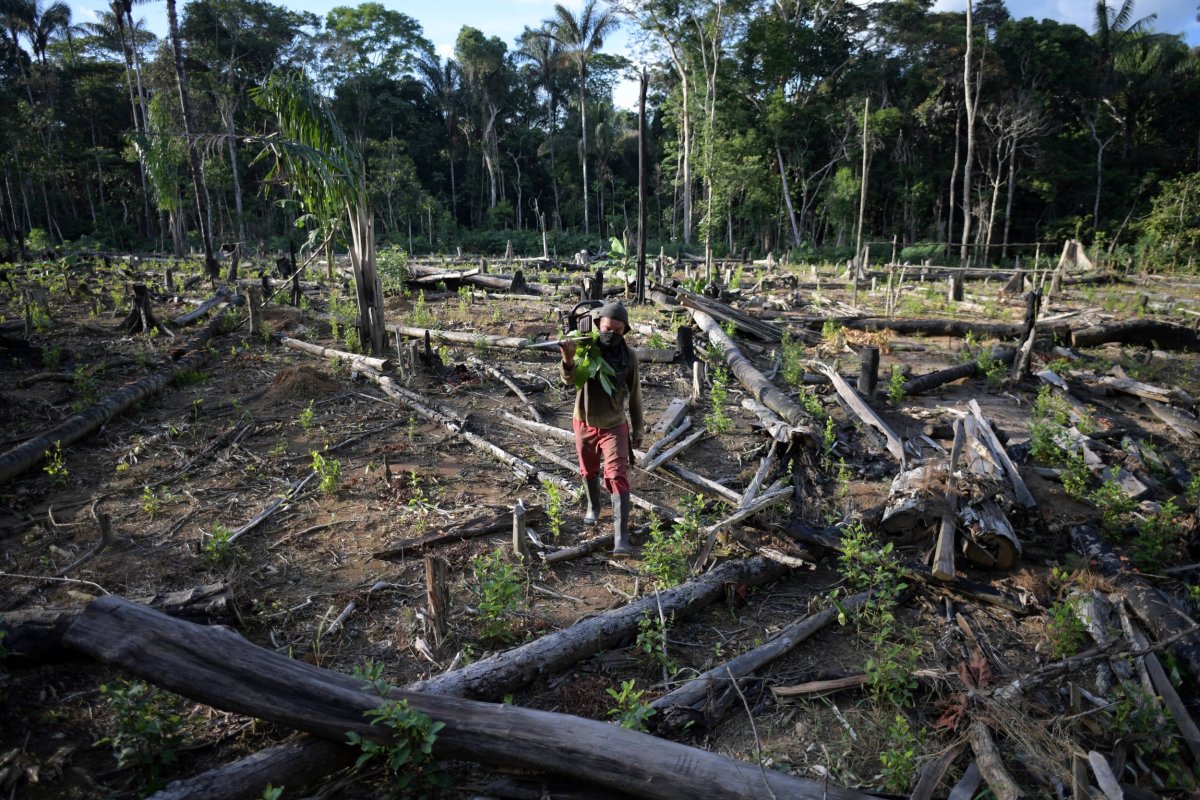Colombia is making bold moves at the United Nations COP28 climate talks to end the use of fossil fuels and enhance the role forests play as a climate solution.
Despite being the leader of one of the world’s top 25 oil producing nations, Colombian President Gustavo Petro joined a call to phase out fossil fuels.
“Some may ask, why would the president of this country want to commit suicide with an economy that relies on fossil fuels?” Petro told the COP28 delegates in Dubai. “We are trying to halt a suicide, the death of everything that is alive.”
Courtesy of Columbia Environment Ministry
Political scientist and environmentalist Susana Muhamad is Colombia’s minister of environment and sustainable development. Muhamad is tasked with guiding the move away from oil and gas and halting deforestation in Colombia’s vast and biodiverse forests, which include portions of the Amazon basin. Doing so will take far greater investment, she said.
“Right now, the economic system is not aligned, and the financial system is not aligned with the climate crisis,” Muhamad told Newsweek in an interview from the COP28 talks, which is presented below and has been edited for length and clarity.
Colombia is part of the Amazonia 80 by 25 campaign, a multinational effort aiming to protect 80 percent of Amazonian forests by 2025. But Muhamad said Colombia will need better international financing to protect forests and achieve an energy transition.
Newsweek: Colombia has decided to join the alliance calling for a fossil fuel non-proliferation treaty even though your country is among the world’s top oil producers. Was that a difficult decision?
Muhamad: To make the economic transition and lower dependency on fossil fuel exportation, we need to replace this with other economic sectors. And this needs to be done very fast because the world is decarbonizing. So, on the one hand, it was already in the program of President Petro and people voted for that, but on the other hand, of course to make it very real, we need some economic global conditions for this transition to happen and that is exactly what we expect to pursue with this agreement.
And what has the response been—how are Colombians and how is the oil industry there reacting?
The reactions have been mixed, of course. Some people are thinking, as the president said in his speech, that maybe we will be committing an economic suicide. But actually, it’s totally the opposite, it’s looking for better economic conditions for the transition of Colombia and at the same time starting to create an economy that responds to the reality of climate change, which is something where all of us have responsibility.
Colombia also has a major role as a climate solution due to its forests and their capacity to absorb carbon dioxide. What was your message to COP28 regarding protection of forests?
It is critical to recognize that sustaining and restoring forests is one of the key strategies for the climate convention. It’s actually our main strategy for adaptation to climate change, so it is an important strategy that we want to be reflected in the global stocktake [the U.N. report on meeting climate goals that will emerge from COP28].
What is the status of deforestation in Colombia?
Between 2021 to 2022, we were able to reduce nationally deforestation 29 percent and 36 percent in the Amazon. This is the lowest rate of deforestation since 2013, and we expect further reductions at the end of this year. With the agreement with communities, with organizing economic alternatives, by giving land rights, [this is] the right path. At the same time, we are doing research on organized crime that is contributing to deforestation. However, there is also a dynamic in terms of climate change. Colombia is going to be facing the worst consequences of El Niño, and that’s where the forests become more dry, so they are more vulnerable to deforestation. So, climate change itself really becomes a challenge [to protecting forests].

Andrea Ariza/AFP via Getty Images
Funding for forest protection is a major part of the conversation at COP28. What do you think of what’s been proposed thus far?
The negotiation is moving very slowly, and we want a strong framework on adaptation, and we want strong means of implementation, which means enough financing for adaptation. Reducing fossil fuel emissions has to be linked to funding for adaptation, which actually includes for us biodiversity and forest protection.
Another mechanism we have been working on is the debt for climate action multilateral mechanism, where debt can be used annually for 10 years for these types of programs. If you have more fiscal space and the governments are less strangled by debt, you can also have the economic flows that you need to put money into climate action.
I see, so if debt is putting pressure on countries to develop resources, what would happen if some of that debt was instead forgiven in exchange for protecting nature?
It’s been estimated that we need to invest around 3 percent of GDP annually into climate action, and we are just investing 0.16. So where are we going to get that additional fiscal space? A multilateral agreement where part of that foreign debt—the amount of debt that we pay every year is larger than the whole investment budget of the government—if a percentage could be used for climate action, instantly we’ll be able to fulfill that 3 percent of GDP. Right now, the economic system is not aligned, and the financial system is not aligned with the climate crisis. We are in a situation where ambition is punished. Access to capital for the [Global] South is very expensive, and in these conditions, the transition will be very difficult. We will need reforms so that rather than punishing, we should prioritize climate action.


